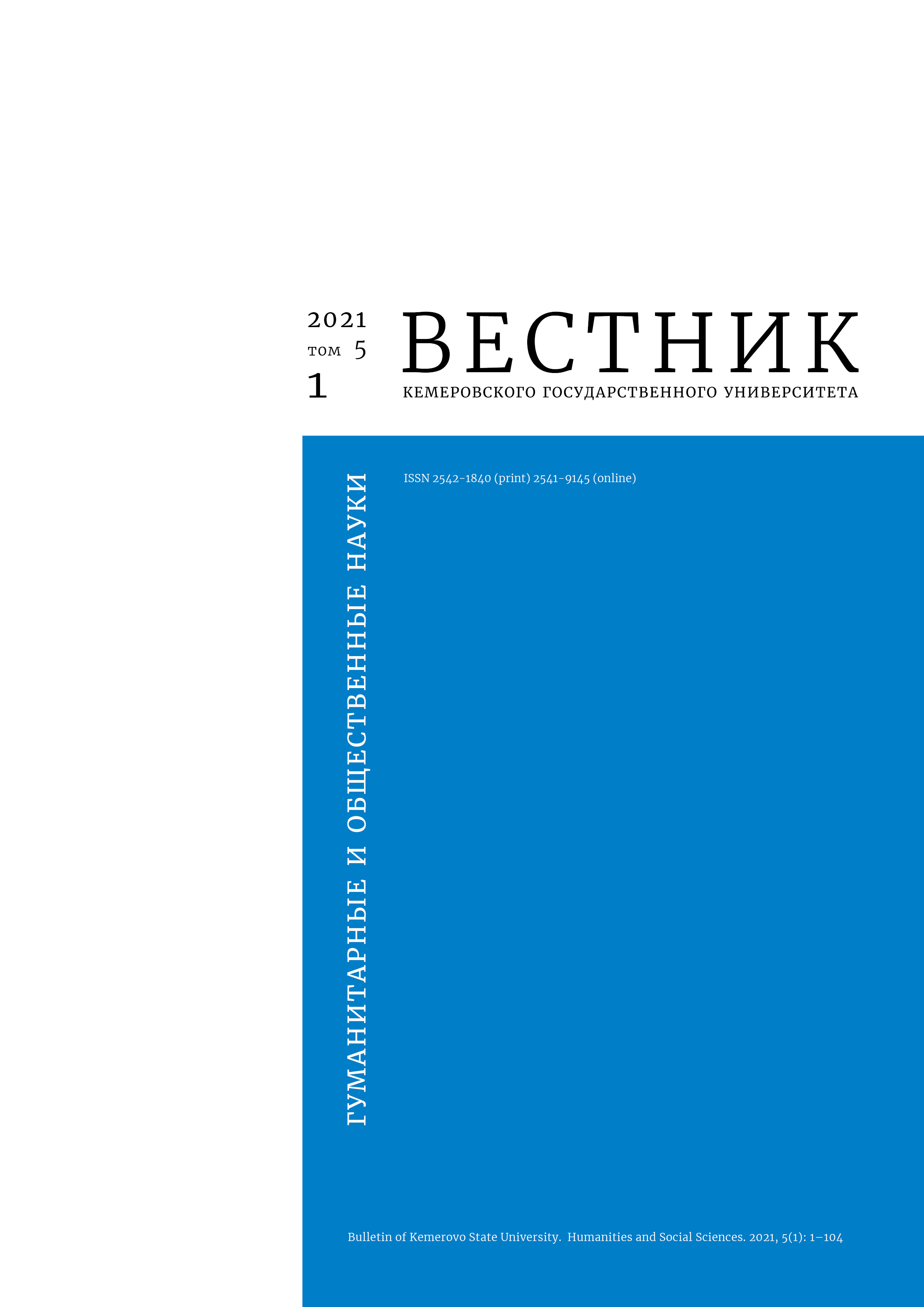Prokopyevsk, Russian Federation
UDC 37
The present research tested various technologies of pedagogical support of tolerance development in students of a technical university during foreign language acquisition. The paper reviews scientific approaches to the essence of tolerance and introduces the stages of its formation, the definitions of pedagogical technology and teaching technology, etc. The author focused on teaching a foreign language in a non-linguistic university and proved that the choice of forms, methods, and technologies depends on a number of circumstances. The research revealed substantive characteristics of tolerance in students and the positive effect of second language acquisition on the parameters of tolerance. The changes in the content characteristics of tolerance were registered on the basis of the corresponding indicators. The study made it possible to determine the effectiveness of the classroom and extracurricular conditions that contribute to the development of tolerance in students of technical universities.
student of a technical university, dynamics of content characteristics of tolerance, role-playing game, discussion, language club, web-quest technology
1. Aripova M. L. Modern world and the problem of tolerance. Problemy pedagogiki, 2018, (1): 13-15. (In Russ.)
2. Ageev V. S. Psychology of intergroup relations. Moscow: Izd-vo MGU, 1983, 144. (In Russ.)
3. Kabanova E. E., Vetrova E. A. Formation of tolerance in society in the modern world. Sotsial'no-ekonomicheskiye yavleniya i protsessy, 2017, 12(2): 47-50. (In Russ.)
4. Khugaeva F. V. Tolerance as a principle of education in a multicultural society. Azimuth of Scientific Research: Pedagogy and Psychology, 2014, (1): 71-74. (In Russ.)
5. Izotikova I. G. Need for raising tolerance in modern school. Simvol nauki, 2016, (5-2): 151-152. (In Russ.)
6. Apanasyuk L. A. Pedagogical efficiency of xenophobia overcoming in the youth sphere. Baltiiskii gumanitarnyi zhurnal, 2013, (3): 10-15. (In Russ.)
7. Bobrova T. V., Dranishnikov S. A. Development of identity and tolerance in foreign university students. Vestnik Kemerovskogo gosudarstvennogo universiteta. Seriia: Gumanitarnye i obshchestvennye nauki, 2020, 4(3): 187-197. (In Russ.) DOI:https://doi.org/10.21603/2542-1840-2020-4-3-187-197
8. Kravtsov G. G., Nuri T. Psychological content of the toleration concept. RSUH/RGGU Bulletin. "Psychology. Pedagogics. Education" Series, 2010, (17): 23-35. (In Russ.)
9. Pankin A. B., Shurguchiev Kh. E. Tolerance: the problems of determining the criteria and characteristics. Vestnik Kalmytskogo instituta gumanitarnykh issledovaniy RAN, 2013, 6(1): 89-96. (In Russ.)
10. Pochebut L. G. Cross-cultural communicative competence: tolerance or assertiveness. Vestn. Udm. un-ta. Ser. Filosofiia. Psikhologiia. Pedagogika, 2017, 27(2): 189-195. (In Russ.)
11. Koriakina A. A. The question of the formation of tolerance in the multicultural educational environment. Azimuth of Scientific Research: Pedagogy and Psychology, 2019, 8(1): 179-182. (In Russ.) DOI:https://doi.org/10.26140/anip-2019-0801-0044
12. Leontiev M. G. Multicultural education and formation of ethnocultural competence of students of the university. Vestnik MGSU, 2011, (6): 532-534. (In Russ.)
13. Kolomok O. I., Kabanova N. E. Multicultural environment of a higher school as a necessary condition for development of students' ethno-cultural competence. Teoriia i praktika obshchestvennogo razvitiia, 2014, (17): 180-182. (In Russ.)
14. Skorniakova E. R. Modern pedagogical technologies in teaching foreign languages. Problemy i perspektivy razvitiia obrazovaniia v Rossii, 2011, (9): 261-267. (In Russ.)
15. Kholod N. I., Egorova O. S. Feast as a pedagogical form of teaching a foreign language in a higher institution. Jaroslavskij pedagogicheskij vestnik, 2015, (6): 123-128. (In Russ.)
16. Egorova A. A., Sergeeva O. V. The role of a linguistic club in the foreign language communicative competency development. Vestnik Kostromskogo gosudarstvennogo universiteta. Seriia: Pedagogika. Psikhologiia. Sotsiokinetika, 2019, 25(2): 178-182. (In Russ.) DOI:https://doi.org/10.34216/2073-1426-2019-25-2-178-182
17. Voronova E. N. Modern technologies and methods of teaching foreign language in higher educational institution. Perspektivy nauki i obrazovaniya, 2014, (1): 189-194. (In Russ.)
18. Ageyenko N. V., Rybkina A. A. Innovative technologies in teaching a foreign language. Vestnik Samarskogo gosudarstvennogo tekhnicheskogo universiteta. Ser. Psikhologo-pedagogicheskiye nauk, 2017, (4): 7-14. (In Russ.)
19. Karpova E. O. Cooperative and collaborative foreign language teaching of future economists. Prepodavatel XXI vek, 2013, (3-1): 194-200. (In Russ.)
20. Maksudov U. O. Modern methods and techniques of foreign language teaching the students of a non-linguistic university. Vestnik Kemerovskogo gosudarstvennogo universiteta kul'tury i iskusstv, 2019, (47): 215-219. (In Russ.)
21. Uvarov V. I. Topical issues of teaching a foreign language in a non-linguistic university and their possible solutions. RSUH/RGGU Bulletin. "Psychology. Pedagogics. Education" Series, 2018, (3): 145-156. (In Russ.) DOI:https://doi.org/10.28995/2073-6398-2018-3-145-156
22. Perova V. M. Building motivation among students learning foreign languages. Teaching Methodology in Higher Education, 2017, 6(21): 49-56. (In Russ.) DOI:https://doi.org/10.18720/HUM/ISSN2227-8591.21.5
23. Buldina I. A. Main teaching principles of speaking English of non-linguistic students with different basic levels. Karelskii nauchnyi zhurnal, 2016, 5(4): 9-12. (In Russ.)
24. Kazantsev A. Yu., Kazantseva G. S. Effectiveness in teaching English language speaking in higher school. Vestnik TGPU, 2014, (3): 105-109. (In Russ.)
25. Stepanova M. M. Forming spontaneous speech skills when teaching business foreign language for technical master students. Trudy SPbGUKI, 2016, 214: 48-52. (In Russ.)
26. Idilova I. S. Learner-centred approach to developing listening skills in a non-linguistics university. Vestnik Moskovskogo gosudarstvennogo lingvisticheskogo universiteta. Obrazovanie i pedagogicheskie nauki, 2018, (2): 164-176. (In Russ.)
27. Soldatova G. U., Kravtsova O. A., Khukhlaev O. E., Shaigerova L. A. Psychodiagnostics of tolerance. Psychologists about migrants and migration in Russia, eds. Soldatova G. U., Shaigerova L. A. Moscow: Smysl, 2002, vol. 4, 59-65. (In Russ.)
28. Questionnaire for measuring tolerance (V. S. Magun, M. S. Zhamkochian, M. M. Magura). Psychodiagnostics of personality tolerance, eds. Soldatova G. U., Shaigerova L. A. Moscow: Smysl, 2008, 51-59. (In Russ.)
29. Pochebut L. G. Mutual understanding of cultures: methodology and methods of ethnic and cross-cultural psychology. Psychology of interethnic tolerance. St. Petersburg: Izd-vo S.-Peterburgskogo universiteta, 2005, 279. (In Russ.)
30. Pochebut L. G. Cross-cultural and ethnic psychology. St. Petersburg: Piter, 2012, 334. (In Russ.)


















